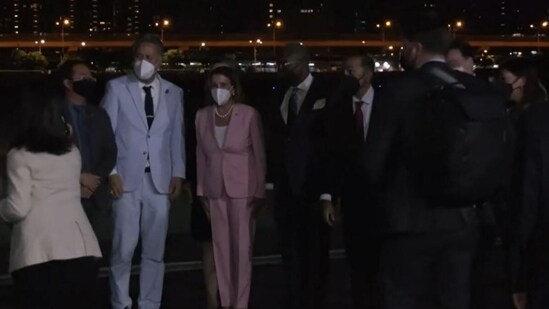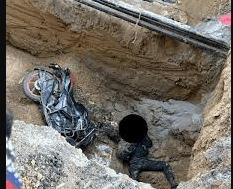
Nancy Pelosi Lands in Taiwan Ignoring Chinese Warnings
Manas Dasgupta
NEW DELHI, Aug 2: In a major development that may have international ramifications, the US House Speaker Nancy Pelosi, the third most important person in the American political hierarchy after the president and the vice-president, landed in Taiwan on Tuesday evening ignoring China’s repeated warning.
The flight carrying her landed in Taipei airport as China closed Taiwan Strait and east coast airspace around Xiamen area. Beijing, which regards Taiwan as part of its territory, has promised “grave consequences” for the visit by the highest-ranking US official in 25 years.
Her visit, a first in 25 years, has triggered tension in global politics with China and the US sending strong messages to one another. China has repeatedly issued warnings over Pelosi’s visit to Taiwan, saying it would be a provocation and violation of the country’s sovereignty and territorial integrity. Chinese fighter jets and warships have also been deployed near Taiwan to augment the pressure on the US against Pelosi’s visit. In response, as many as four US warships, including an aircraft carrier, were positioned in waters east of Taiwan on what the country’s Navy called “routine deployments.”
“The US is taking provocative actions that could escalate tensions across the Taiwan Straits. It must take full responsibility. The US would surely bear responsibility and pay price for undermining China’s sovereignty and security interests. Don’t say we did not warn you,” a Chinese foreign ministry spokesperson had said.
The US C-40C aircraft circled around and approached Taiwan from the Philippine Sea. Chinese fighter jets have crossed the Taiwan Strait, local media reported today, as tensions flare over Pelosi’s impending visit. “China’s Su-35 fighter jets are crossing the Taiwan Straits,” state media reported, without adding further details.
The Chinese leadership has repeatedly warned against Pelosi, a long-time critic of Beijing, making a trip to self-ruled Taiwan. China regards Taiwan as part of its territory and has vowed an unspecified military response to any Pelosi visit that risks sparking a crisis between the world’s biggest economies.
For days, Taiwan was preparing its air-raid shelters as rising tension with China and Russia’s invasion of Ukraine raise new fears about the possibility of a Chinese attack on the democratic island.
China considers Taiwan its territory and has increased military activity in the air and seas around it. Taiwan vows to defend itself and has made strengthening its defences a priority, with regular military and civil defence drills.
The preparations include designating shelters where people can take cover if Chinese missiles start flying in, not in purpose-built bunkers but in underground spaces like basement car parks, the subway system and subterranean shopping centres.
The capital of Taipei has more than 4,600 such shelters that can accommodate some 12 million people, more than four times its population. Harmony Wu, 18, was surprised to learn that an underground shopping concourse where she and other youngsters were recently rehearsing some dance moves would be turned into an air-raid shelter in the event of war.
Taipei officials have been updating their database of designated shelters, putting their whereabouts on a smartphone app and launching a social media and poster campaign to make sure people know how to find their closest one.
Shelter entrances are marked with a yellow label, about the size of an A4 piece of paper, with the maximum number of people it can take. A senior official in the city office in charge of the shelters said events in Europe had brought a renewed sense of urgency.
Last month, Taiwan held a comprehensive air-raid exercise across the island for the first time since the coronavirus pandemic disrupted regular drills. Among the instructions citizens got in case of incoming missiles was to get down in their basement parking lots with their hands covering their eyes and ears while keeping their mouths open – to minimise the impact of blast waves.
Some civil defence advocates say more needs to be done. Authorities are required by law to keep the shelters clean and open but they don’t have to be stocked with supplies like food and water. Researchers in parliament called in June for shelters to be provided with emergency supplies.
After decade of sabre-rattling across the Taiwan Strait separating the democratic island from China, many Taiwan people appear resigned to living with the threat of a Chinese invasion. “I’m not stressed. I carry on with my life as usual. When it happens, it happens,” said Teresa Chang, 17, who was also going through her paces at the underground dance practice.











